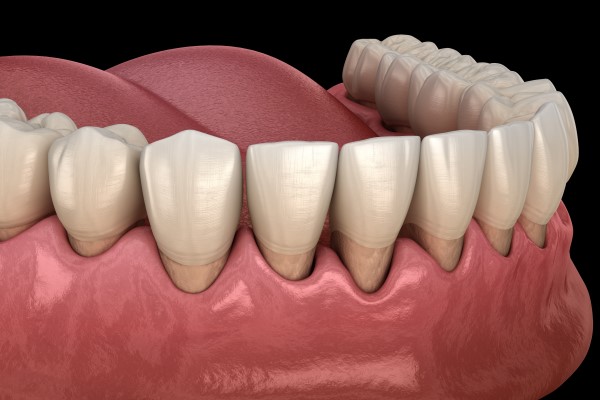Peridontal Therapy: Scaling and Root Planing

Periodontitis, or gum disease, is a serious infection that can be fixed by scaling and root planing during a dental appointment. This treatment is a form of periodontal therapy that is not invasive and does not involve surgery, though it can cause discomfort depending on the patient. For those experiencing the beginning stages of gum disease, scaling and root planing can be an excellent option to reverse the adverse effects on gums and teeth.
What is periodontitis?
There are many aspects of periodontitis, and the severity of the infection determines the extent of teeth and gum damage. Learning the signs of gum disease can get patients into the dentist’s office quickly to prevent the spread of infection.
Gingivitis
A patient may first notice symptoms of discomfort and pain surrounding teeth. Healthy gums are not sensitive and do not bleed from daily oral hygiene practices, but infected gums may be inflamed, red, tender or bleed after brushing or flossing. The good news is that this is the initial stage of gum disease, called gingivitis, when damage is still not severe. The gums have not pulled away from the teeth, and tissue and ligaments in the jaw have not yet been affected.
Periodontitis
After gingivitis, the infection spreads deep beneath the gums into the tissue that attaches teeth to the jawbone. As tissue starts to decay, teeth may become loose and fall out. The jawbone itself can also wear away under the force of infection.
Plaque and bacteria
Plaque, a clear or yellow substance that sticks to the outside of teeth, builds up in pockets between the teeth and gums. Bacteria living inside the plaque emit toxic acids that erode the enamel and gums, creating an infection. This can result in cavities and decay in teeth and cause a decline in the gums. Plaque must be removed by a dentist to stop the infection.
What is periodontal therapy?
Periodontal therapy is the procedure a dentist uses to get rid of the infection and alleviate the pain caused by it. While some patients require surgery, many can go in for a deep cleaning to remove plaque.
Scaling and root planing
A deep cleaning comes in two parts: scaling, followed by root planing. Scaling is the process of using a hand instrument to scratch the plaque off of teeth, and root planing smooths out abrasions along the root of the tooth to which plaque can easily stick. Together, these techniques eliminate plaque and tartar from the mouth. A special dental procedure is necessary to remove plaque because of deep pockets between the teeth and gums that cannot be cleaned with normal tools. These pockets become deeper if plaque remains inside to eat away at the gums, so a dentist much make sure the pocket is completely cleaned.
Conclusion
Periodontitis becomes a reality for many patients who fail to go to a dentist regularly or do not complete daily brushings at home. Do not allow plaque to remain if symptoms of gum disease arise, and contact a dentist immediately about scaling and root planing.
Request an appointment here: https://www.smilesbyjulia.com or call Smiles By Julia at (954) 493-6556 for an appointment in our Fort Lauderdale office.
Check out what others are saying about our dental services on Yelp: Root Scaling and Planing in Fort Lauderdale, FL.
Related Posts
Gum disease is also known as periodontal disease. This is a condition that causes inflammation of the tissue around the patient’s teeth. It is caused by bacteria building up in the area. Keep reading to learn about some of the symptoms of gum disease.Periodontal disease is a progressive condition, meaning it gets worse over time.…
Gum disease is a serious condition that can result in a need for periodontal treatment. Periodontal treatment is often necessary to destroy the infection and prevent it from worsening. Often, without treatment, a case of gum disease can become advanced, resulting in tooth loss, receding gums, and even jaw deterioration, all of which can be…
Gum disease, also commonly referred to as periodontal disease, is an inflammation of the gums. It is caused by plaque, which is a sticky, colorless film of bacteria that often forms on teeth. Gum disease usually causes tooth loss. It is often painless so you may not even know you have it. Fortunately, gum disease…
Gingivitis and periodontitis, which are stages of gum disease, are serious conditions that can wreak havoc on a patient's oral health. Left untreated, these issues can lead to gum recession and eventual tooth loss. The good news, though, is that these problems are often preventable, and the steps needed to avoid them are easier than…
